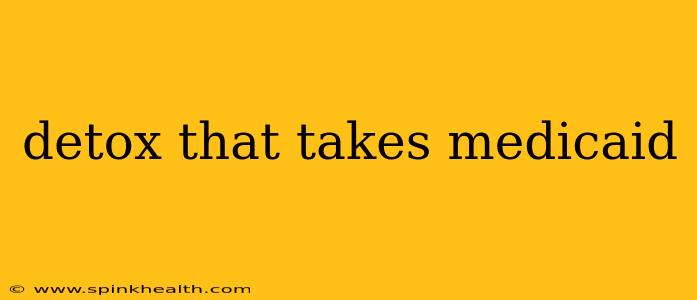Navigating the World of Medicaid-Covered Detox: A Comprehensive Guide
The journey to recovery from substance abuse is deeply personal, and finding the right resources is crucial. For many, the financial burden of detox can feel insurmountable. This is where understanding Medicaid's role in covering detox services becomes vital. This guide will walk you through the process of accessing Medicaid-funded detox, addressing common questions and concerns along the way.
Let's begin with my own story. I've spent years working with individuals navigating the complexities of the healthcare system, particularly those seeking substance abuse treatment. I've witnessed firsthand the relief that comes with finding affordable, quality care. This article is born from that experience, aiming to provide clear, accurate, and compassionate information.
What is Medicaid and how does it cover detox?
Medicaid is a joint federal and state government program providing healthcare coverage to low-income individuals and families. Eligibility requirements vary by state. While Medicaid doesn't universally guarantee detox coverage, many states include it as a covered benefit under their substance use disorder (SUD) treatment programs. The specifics of what's covered—the length of stay, the type of facility, and specific treatments—depend greatly on your state's Medicaid plan.
H2: What types of detox facilities accept Medicaid?
Medicaid coverage for detox typically extends to various facilities, including:
- Inpatient detox centers: These centers provide 24/7 medical supervision and support during the withdrawal process. They’re ideal for individuals experiencing severe withdrawal symptoms.
- Outpatient detox programs: These programs offer a less intensive level of care, allowing individuals to continue living at home while attending regular sessions for monitoring and support. They are suitable for those with milder withdrawal symptoms.
H2: How do I find a Medicaid-approved detox center near me?
Finding a Medicaid-approved detox center requires research and patience. Here's a step-by-step process:
- Contact your state's Medicaid agency: They can provide a list of approved providers in your area. Your state's Medicaid website is a great starting point.
- Use online search engines: Search for "Medicaid-approved detox centers [your city/state]" to find local options. Review online reviews and ratings carefully.
- Reach out to local healthcare providers: Your primary care physician or a local substance abuse treatment center can also offer referrals.
- Check with community organizations: Organizations that support individuals with SUD often have extensive lists of local resources.
H2: What are the eligibility requirements for Medicaid detox services?
Eligibility for Medicaid varies by state. Generally, you'll need to meet certain income and residency requirements. You'll also need to demonstrate a need for detox services, often through a medical assessment or evaluation. This assessment confirms the severity of your SUD and the necessity of detox treatment. Again, contacting your state's Medicaid agency directly is crucial for the most up-to-date information on eligibility criteria.
H2: What if Medicaid doesn't fully cover the cost of detox?
Even with Medicaid, you might face out-of-pocket expenses such as co-pays or deductibles. If this is the case, several avenues might be available:
- Negotiate payment plans: Many treatment centers offer payment plans to make care more accessible.
- Explore financial assistance programs: Some detox centers and organizations offer financial assistance or scholarships to help bridge the gap.
- Seek help from charities and non-profits: Many organizations support individuals seeking substance abuse treatment.
H2: What kind of aftercare is available after Medicaid-covered detox?
Detox is only the first step in recovery. Successful long-term recovery typically requires ongoing treatment and support. Medicaid often covers subsequent treatment phases, such as:
- Rehabilitation: Inpatient or outpatient rehabilitation programs help individuals develop coping skills and address the underlying causes of their addiction.
- Therapy: Individual and group therapy sessions provide support and guidance throughout the recovery journey.
- Medication-assisted treatment (MAT): MAT involves using medications to manage withdrawal symptoms and cravings.
Finding the right path to recovery is a journey, not a race. Remember, seeking help is a sign of strength. This guide is intended to offer guidance, not medical advice. Always consult with your healthcare provider or a qualified substance abuse professional to discuss your specific needs and treatment options.

